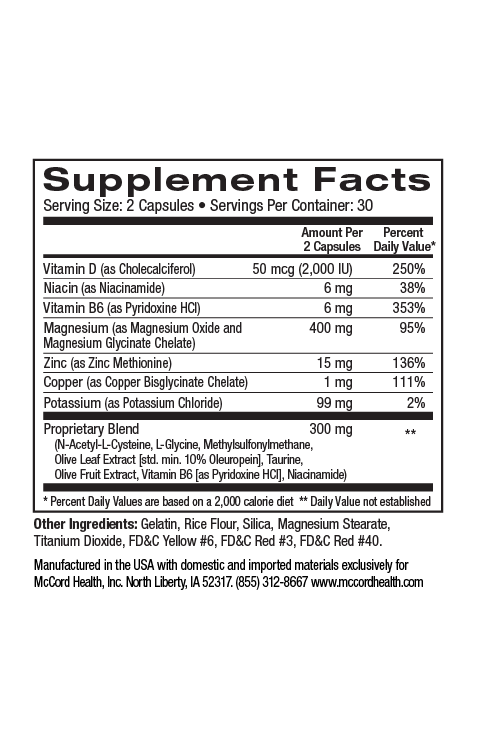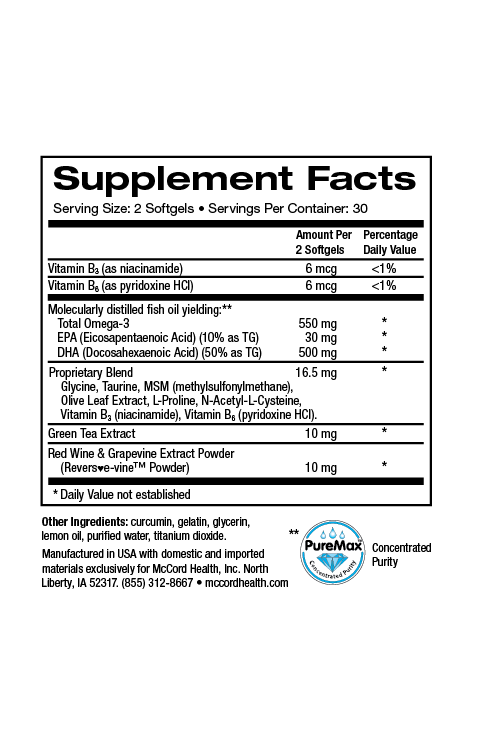Magnesium is one of the most important minerals for overall health, but deficiency is common and contributes to multiple disease processes. Symptoms of magnesium deficiency include headaches, high blood pressure, heart arrhythmias, muscle cramps, mood disorders, insomnia, and more.
- Magnesium is one of the most important minerals in the body
- Deficiency is increasingly common for several reasons
- Deficiency contributes to the cause, symptoms, and/or severity of many health conditions
- Most people could likely benefit from getting more magnesium in their diet
- Magnesium should be included with all calcium supplements
Tell me More about Magnesium!
Magnesium is one of the most important minerals in the body - so important that without it, cells quickly die.
It is the second most abundant electrolyte found inside of the cells and is required for more than 300 different biochemical reactions in the body including the synthesis of the nucleic acids needed to make DNA.1
Magnesium is also required for the proper utilization of other vitamins and minerals including calcium, potassium, zinc, iron, B vitamins, and vitamin D.2,3
What does the research say about the importance of Magnesium?
Magnesium for Bone Health

Over 50% of the body's magnesium is found in the bones and deficiency is associated with osteoporosis.1,3
Magnesium in Cancer
Increased magnesium intake is associated with a lower risk of colorectal cancer, especially when combined with Vitamins A, C, D, and E and dietary fiber.5,6
Magnesium and Depression
Magnesium is important for neurotransmitter function and has been shown to quickly improve mood and assist in treatment-resistant depression.3,7,8
Magnesium and Diabetes
Low magnesium levels are associated with increased risk of type-II diabetes and insulin resistance.1,3
Magnesium Deficiency and Heart Health
Increased magnesium intake is associated with a decreased risk of coronary artery disease.9 Low levels of magnesium are associated with:
- Elevated "bad" cholesterol (LDL), triglycerides, and blood pressure.1
- High blood pressure (hypertension) and irregular heart beats (arrhythmias)
- Formation of blood clots and intensified reactions to stress contributing to heart attack and stroke.10,11
- Elevated levels of C-Reactive Protein (CRP), an inflammatory marker that indicates an increased risk of cardiovascular disease.
- People that do not get the RDI of magnesium have a 40% higher chance of having an elevated CRP.
- In 2006, about 35% of the U.S. population (roughly 70 million people) had a CRP level considered high-risk by the American Heart Association.4,12
Magnesium and Migraine Headaches
Magnesium deficiency is associated with migraine headaches and supplementation has been shown to prevent migraines from happening as often.13,14
Magnesium Deficiency and Muscle Cramps
Approximately 27% of the body's magnesium is found in the muscles. Deficiency is associated with muscle cramps and weakness.15
Magnesium Deficiency and Healthy Sleep
Magnesium deficiency is associated with insomnia while supplementation has been shown to improve the quality of sleep.3,15,16Magnesium is also essential for regulating your internal sleep clock - the circadian rhythm.27
Magnesium in Other Health Conditions
Magnesium plays a role and may offer some benefits in many more disease states including ADD/ADHD, neurodegenerative diseases, dementia, memory loss, asthma, headache, agitation, confusion, restless leg syndrome, immune deficiencies, and many more.15,17–23
Magnesium Deficiency is a Growing Problem
If magnesium is so vital to the health of cells and the proper functioning of the human body, you would think we would make sure that we get enough of it on a daily basis. But why is it that despite being armed with this knowledge, even in our modern times, that so many people are suffering from a deficiency of magnesium? Studies have estimated that the average daily dietary intake of magnesium has decreased by over 50% in the last century alone.2
Why is Magnesium Deficiency on the Rise?
The largest contributing factors involve a change in modern agriculture, food industries, water treatment, and diet.1–3 These factors have contributed in the following ways:
- Food processing removes magnesium leaving only about 3-28% of the original amounts found in cereals and legumes.2
- Magnesium levels in produce have been declining over the past decades as a result of soil depletion and some modern agricultural methods.1–3
- "Hard water" used to account for up to 27% of daily magnesium intake, but water softeners and purifiers remove most of the magnesium in bottled and municipal water supplies.1
- Modern Western diets tend to lack fresh organic produce, relying instead on heavily processed foods.1–3
Magnesium Deficiency Caused by Depletion and Blocked Absorption
In addition to decreased dietary intake, there are also a number of factors that can actually deplete magnesium from the body or block it's absorption including:2,3
- Prolonged or excessive stress
- Certain medical conditions
- Medications
- Sweating
- Menstruation
- Diarrhea or vomiting
- Alcohol
- Phosphates (in soft-drinks and milk)
- Refined sugar
- Excess saturated fats in the diet
- Vitamin D deficiency
- Low stomach acid
Natural Dietary Sources of Magnesium
Rich dietary sources of magnesium include vegetables (especially dark green leaves), nuts and legumes, grain products, dark chocolate, meat, poultry, fish, and dairy products.1 However, because of some of the reasons listed above, you may still need to supplement magnesium, even with a healthy diet. Studies indicate that only about 22% of people meet the recommended daily intake (RDI) without the use of supplements.4
"But my blood levels came back as normal...."
When getting your magnesium levels tested, it is important to know what kind of test is being performed. The most commonly used test for determining magnesium levels measures the amount in your blood serum. While this test may be useful in emergency situations, it is not as useful in determining the overall magnesium status of the entire body.2
Only 0.3% of the body’s magnesium is found in the blood serum while the rest is found inside of cells and in the bones. When serum levels get too low, the body can "borrow" magnesium from the bones and tissues to keep the blood levels within a normal range. It is possible that you may have a normal serum magnesium lab result, but have low levels in the rest of your body. There are less commonly used tests that give a more accurate picture of total body magnesium status by measuring the levels of magnesium inside of cells, or how much is being excreted in the urine.2
Supplementing Magnesium
These Olivamine® Supplements from McCord Research contain magnesium in the following amounts:
| VitalBoost | 400 mg |
| BrainHealth | 60 mg |
| CalmMind | 140mg |
| SleepHealth | 144 mg |
| JointHealth | 17 mg |
Although it is safe for most people to supplement magnesium, it is always best to check with a trusted and licensed healthcare provider that is familiar with your specific medical history before supplementing.
Can you take too much magnesium?
One of the best things about supplementing magnesium is that your body gives you a very clear signal if you've taken too much, before causing any harm - and that signal is diarrhea.
In fact, a large dose (several grams) of magnesium citrate is commonly prescribed as part of the bowel prep for colonoscopies.
It is still best to work with your doctor to determine the amount you should be using, especially if you have kidney or heart problems. The Olivamine® products use doses that are within a tolerable range (i.e. shouldn't cause diarrhea) that only represent a fraction of what is safely administered as part of bowel preparations for colonoscopies.
The Interplay of Magnesium and Calcium
Magnesium and calcium have an interesting relationship with one another. They are chemically very similar (divalent cations) yet have different roles in the body. At the same time they are interdependent of one another.
For example, both magnesium and calcium work together to regulate blood pressure and heart rhythms. While both can help blood vessels to relax, an excess of calcium tends to cause hypertension and cardiovascular problems while an excess of magnesium has the opposite effect.24 In fact, excess magnesium appears to have a protective effect against high blood pressure and heart problems.24
The significance of this relates to the way calcium has been recommended for so many years. We have always been told to eat more calcium for stronger bones, yet new research has been showing that calcium supplementation is associated with increased cardiovascular problems.24-26 It is likely that that an imbalance of calcium and magnesium is a major contributing factor, leading many providers to recommend extra magnesium to people taking calcium supplements.
We learned that Vitamin D helps improve calcium absorption, and now it's almost impossible to find a calcium supplement without Vitamin D. Now we are beginning to understand how important it is to include both magnesium and vitamin D with calcium.
References
- Jing Ma, Aaron R Folsom, Sandra L. Melnick, John H Eckfeldt, A. Richey Sharrett, Azmi A. Nabulsi RGH ad PAM. Associations of Serum and Dietary Magnesium with Cardiovascular Disease, Hypertension, Diabetes, Insulin and Carotid Arterial Wall Thickness: The Aric Study. J Clin Epidemiol. 1995;48(7):927–940.
- Fawcett WJ, Haxby EJ, Male D a. Magnesium: physiology and pharmacology. Br J Anaesth. 1999;83(2):302–20.
- Johnson S. The multifaceted and widespread pathology of magnesium deficiency. Med Hypotheses. 2001;56(2):163–70.
- King D, Mainousiii a, Geesey M, Egan B, Rehman S. Magnesium supplement intake and C-reactive protein levels in adults. Nutr Res. 2006;26(5):193–196.
- Folsom AR, Hong C. Original Contribution Magnesium Intake and Reduced Risk of Colon Cancer in a Prospective Study of Women. 2006;163(3):232–235.
- Larsson SC, Bergkvist L, Wolk A. Magnesium intake in relation to risk of colorectal cancer in women. JAMA. 2005;293(1):86–9.
- Eby G a, Eby KL. Rapid recovery from major depression using magnesium treatment. Med Hypotheses. 2006;67(2):362–70.
- Eby GA, Eby KL. Magnesium for treatment-resistant depression: a review and hypothesis. Med Hypotheses. 2010;74:649–60.
- Al-Delaimy WK, Rimm EB, Willett WC, Stampfer MJ, Hu FB. Magnesium intake and risk of coronary heart disease among men. J Am Coll Nutr. 2004;23(1):63–70.
- Seelig MS. Consequences of Magnesium Deficiency on Enhancement of Stress Reactions; Preventive and Therapeutic Implications. J Am Coll Nutr. 1994;13(5):429–46.
- Shechter M, Merz CN, Rude RK, et al. Low intracellular magnesium levels promote platelet-dependent thrombosis in patients with coronary artery disease. Am Heart J. 2000;140(2):212–8.
- Bo S, Durazzo M, Guidi S, et al. Dietary magnesium and fiber intakes and inflammatory and metabolic indicators in middle-aged subjects from a population-based cohort. Am J Clin Nutr. 2006;(7):1062–1069.
- Sun-Edelstein C, Mauskop A. Role of magnesium in the pathogenesis and treatment of migraine. Expert Rev Neurother. 2009;9(3):369–79.
- Kohne-Volland PW. Prophylaxis of migrane with oral magnesium: results from a prospective, multi-center, placebo-controlled and double-blind randomized study. Cephalalgia. 1996;16(257).
- Hornyak M, Voderholzer U, Hohagen F, Berger M, Riemann D. Magnesium therapy for periodic leg movements-related insomnia and restless legs syndrome: an open pilot study. Pharmacol Sleep. 1998;21(5):501–5.
- Rondanelli M, Opizzi A, Monteferrario F, Antoniello N, Manni R, Klersy C. The effect of melatonin, magnesium, and zinc on primary insomnia in long-term care facility residents in Italy: a double-blind, placebo-controlled clinical trial. J Am Geriatr Soc. 2011;59(1):82–90.
- Mousain-Bosc M, Roche M, Rapin J, Bali J-P. Magnesium VitB6 intake reduces central nervous system hyperexcitability in children. J Am Coll Nutr. 2004;23(5):545S–548S.
- Crosby V, Wilcock a, Corcoran R. The safety and efficacy of a single dose (500 mg or 1 g) of intravenous magnesium sulfate in neuropathic pain poorly responsive to strong opioid analgesics in patients with cancer. J Pain Symptom Manage. 2000;19(1):35–9.
- Lemke MR. Plasma Magnesium Decrease and Altered Calcium / Magnesium Ratio in Severe Dementia of the Alzheimer Type. Biol Psychiatry. 1995;37:341–343.
- Gilliland FD, Berhane KT, Li Y, Kim DH, Margolis HG. Dietary Magnesium, Potassium, Sodium, and Children’s Lung Function. Am J Epidemiol. 2002;155(2):125–131.
- Tam M, Gómez S, González-Gross M, Marcos A. Possible roles of magnesium on the immune system. Eur J Clin Nutr. 2003;57(10):1193–7.
- Saris NE, Mervaala E, Karppanen H, Khawaja J a, Lewenstam A. Magnesium. An update on physiological, clinical and analytical aspects. Clin Chim Acta. 2000;294:1–26.
- Rude RK. Magnesium deficiency: a cause of heterogeneous disease in humans. J Bone Miner Res. 1998;13(4):749–58.
- Mccarron DA. Calcium, Magnesium, and Phosphorus Balance in Human and Experimental Hypertension. Hypertension. 1982;4(5):III27-33.
- Tankeu AT, Ndip Agbor V, Noubiap JJ. Calcium supplementation and cardiovascular risk: A rising concern. J Clin Hypertens. 2017;19(6):640-646.
- Hagen G, Wisløff T, Kristiansen IS. The predicted lifetime costs and health consequences of calcium and vitamin D supplementation for fracture prevention—the impact of cardiovascular effects. Osteoporos Int. 2016;27(6):2089-2098.
- Feeney KA, Hansen LL, Putker M, et al. Daily magnesium fluxes regulate cellular timekeeping and energy balance. Nature. 2016;532(7599):375-379.
Disclaimer: These statements have not been reviewed by the FDA. These products are dietary supplements and are not intended to treat, cure, or prevent any disease. The decision to use these products should be discussed with a trusted healthcare provider. The authors and the publisher of this work have made every effort to use sources believed to be reliable to provide information that is accurate and compatible with the standards generally accepted at the time of publication. The authors and the publisher shall not be liable for any special, consequential, or exemplary damages resulting, in whole or in part, from the readers’ use of, or reliance on, the information contained in this article. The publisher has no responsibility for the persistence or accuracy of URLs for external or third party Internet websites referred to in this publication and does not guarantee that any content on such websites is, or will remain, accurate or appropriate.






